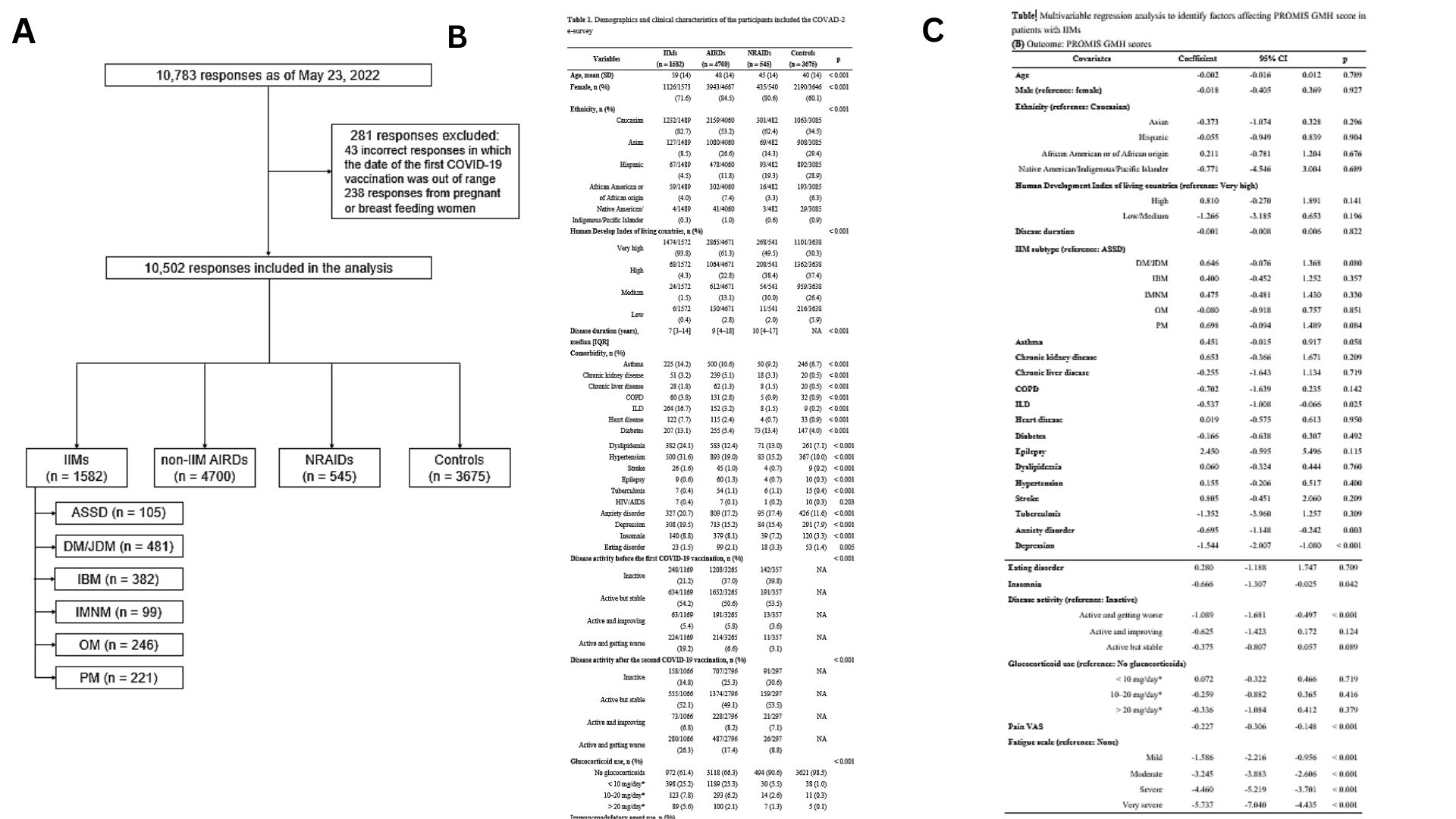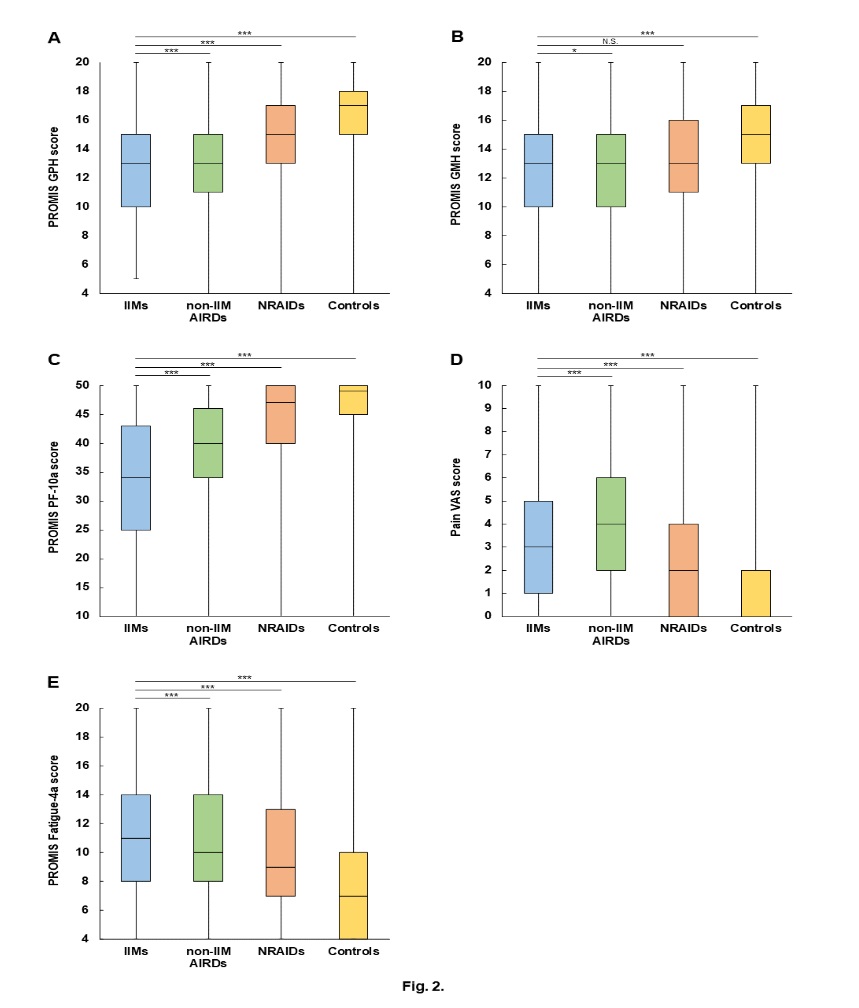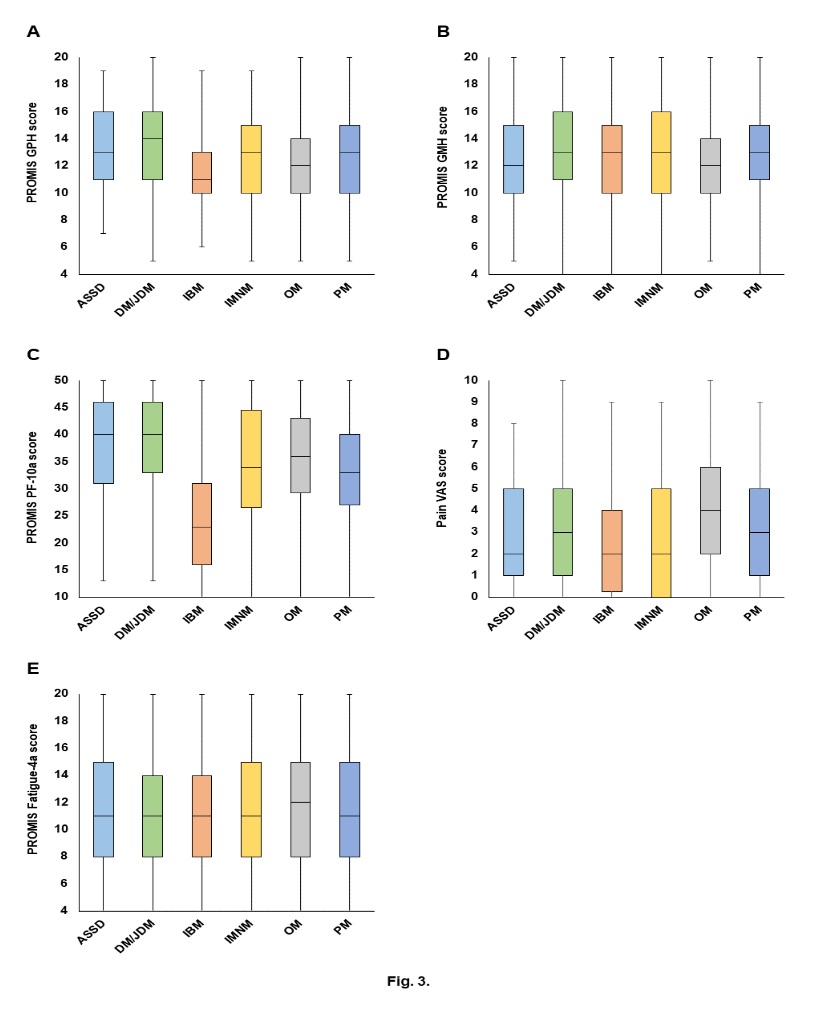Session Information
Date: Tuesday, November 14, 2023
Title: (1945–1972) Muscle Biology, Myositis & Myopathies – Basic & Clinical Science Poster III
Session Type: Poster Session C
Session Time: 9:00AM-11:00AM
Background/Purpose: The significance of Health-related quality of life (HRQoL) in patients with autoimmune diseases is well acknowledged. Unfortunately, there is dearth of data on the HRQoL in patients with idiopathic inflammatory myopathies (IIMs)and factors adversely impacting it.
Methods: HRQoL was measured in patients classifiable as IIMs and compared with non-IIM autoimmune inflammatory rheumatic diseases (AIRDs), non-rheumatic autoimmune inflammatory diseases (NRAIDs), and healthy controls, using Patient-Reported Outcome Measurement Information System (PROMIS) instrument data obtained through the 2nd COVID-19 vaccination in autoimmune disease (COVAD-2), a global patient reported e-survey that was extensively validated and pilot tested by a team of experts (160 collaborators, 100 countries).
Demographics, diagnoses, comorbidities, disease activity, treatments, and PROMIS instrument data were extracted from the COVAD-2 database. (Fig. 1D) Primary outcomes were PROMIS Global Physical Health (GPH) and Mental Health (GMH). Secondary outcomes were PROMIS Physical Function 10a (PF-10a), Fatigue-4a scores, and Pain Visual Analog Scores (VAS).
Independent factors affecting GPH and GMH scores in IIMs, also in the whole population were identified using multivariable regression analysis (Fig. 2) Each PROM was stratified by IIM subgroups. (Fig. 3)
Results: Complete responses from 1582 IIMs, 4700 non-IIM AIRDs, 545 NRAIDs, and 3675 controls as of May 22 were analysed. (Fig. 1A)
Notably GPH scores were the lowest in IIMs (Fig. 2A). GMH scores in IIMs were also substantially lower than in controls (Fig. 2B) PROMIS PF-10a scores were the lowest in IIMs. (Fig. 2C) pain VAS scores were the highest in patients with non-IIM AIRDs (Fig. 2D) PROMIS Fatigue-4a scores were the highest in IIMs (Fig. 2E) indicating increased fatigue in patients with IIMs.
Among IIM subsets, PROMIS GPH and PF-10a scores were the lowest in patients with IBM. (Fig. 3A & 3C) PROMIS GMH scores were lower in patients with ASSD or OM compared to other subtypes (Fig. 3B). Pain VAS (Fig. 3D) andPROMIS Fatigue-4a scores were the highest in patients with OM (Fig. 3E).
Older age, IBM, hypertension, diabetes, active disease, glucocorticoid use, and higher fatigue scores were the factors for lower GPH scores in IIMs (Fig. 1B), whereas interstitial lung disease, mental disorders, active disease, higher pain VAS, and fatigue scores were independently associated with lower GMH scores in IIMs (Fig. 1C).
Multivariable regression analysis in the overall population identified older age, women, longer disease duration, diagnosis of autoimmune inflammatory diseases including IIMs, and comorbidities as independent factors for lower PROMIS GPH scores. (Fig. 1E) On the contrary, younger age, women, Asian ethnicity, diagnosis of autoimmune inflammatory diseases including IIMs, and comorbidities were independently associated with lower PROMIS GMH scores (Fig. 1F)
Conclusion: Both physical and mental health are significantly impaired in patients with IIMs particularly the elderly, IBM and those with specific comorbidities, calling for greater attention and optimized multidisciplinary care to enhance patient-reported experience and global well-being in this population.
(A) A flow diagram of participant selection
(B) Demographics and clinical characteristics of the participants included the COVAD_2 e-survey
(C) Multivariable regression analysis to identify factors affecting PROMIS GMH score in patients with IIMs
(A): PROMIS GPH scores (B): PROMIS GMH scores (C): PROMIS PH_10a score (D): Pain VAS score
(E): PROMIS Fatigue_4a score
(A): PROMIS GPH scores (B): PROMIS GMH scores (C): PROMIS PH_10a score (D): Pain VAS score
(E): PROMIS Fatigue_4a score
To cite this abstract in AMA style:
Yoshida A, Li Y, Maroufy V, Kuwana M, R N, Makol A, Sen P, Lilleker J, Agarwal V, Kardes S, Day J, Milchert M, Joshi M, Gheita T, Salim B, Velikova T, Gracia-Ramos A, Parodis I, Nikiphorou E, Tan A, Nune A, Cavagna L, Saavedra Salinas M, Shinjo S, Ziade N, Knitza J, Distler O, Chinoy H, Agarwal V, Aggarwal R, Gupta L, Study Group C. Impaired Health-Related Quality of Life in Patients with Idiopathic Inflammatory Myopathies: A Cross-Sectional Analysis from the COVAD Dataset [abstract]. Arthritis Rheumatol. 2023; 75 (suppl 9). https://acrabstracts.org/abstract/impaired-health-related-quality-of-life-in-patients-with-idiopathic-inflammatory-myopathies-a-cross-sectional-analysis-from-the-covad-dataset/. Accessed .« Back to ACR Convergence 2023
ACR Meeting Abstracts - https://acrabstracts.org/abstract/impaired-health-related-quality-of-life-in-patients-with-idiopathic-inflammatory-myopathies-a-cross-sectional-analysis-from-the-covad-dataset/



